-
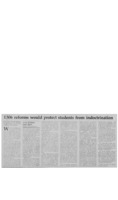 "E 306 Reforms Would Protect Students from Indoctrination"
"E 306 Reforms Would Protect Students from Indoctrination" Part Two of a two-part editorial in support of the change in E 306 curriculum. p. 4
-
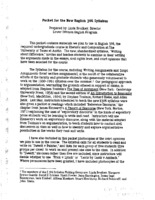 Packet for the New E 306 Syllabus
Packet for the New E 306 Syllabus The full course packet, including syllabus, reading assignments, and assignment descriptions for E 306 "Writing about Difference"
-
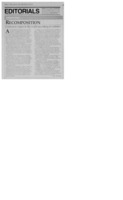 "Recomposition: Confusion Reigns in the World According to Alan Gribben"
"Recomposition: Confusion Reigns in the World According to Alan Gribben" Editorial critiquing Gribben's public complaints about E 306, as well as the open letter in the Daily Texan, "A Statement of Academic Concern." p. 4.
-
 "Gribben Asks Faculty Senate to Screen E 306"
"Gribben Asks Faculty Senate to Screen E 306" News article reporting Gribben's call for Faculty Senate to screen E 306's new curriculum. pp. 1-2
-
 "English 306 not for Politics", "Fix E 306 and stop Bitching", "English or Indoctrination"
"English 306 not for Politics", "Fix E 306 and stop Bitching", "English or Indoctrination" Letters to the editor regarding a previous Daily Texan editorial on the E 306 curriculum controversy from Taylor, Assistant Instructor in English, Garcia, English Graduate, and Budzieszewski, Associate Professor of Government. p. 4
-
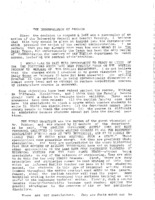 The Decomposition of English
The Decomposition of English Response to elimination of E 346K.
-
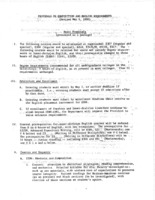 Proposals on Composition, 9 May 1980
Proposals on Composition, 9 May 1980 A 12-page version of the proposals to revise the English composition curriculum, requiring E 306, E 316, and establishing a new course (E 346K).
-
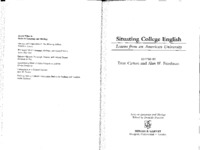 Standard English at the University of Texas
Standard English at the University of Texas Friedman, Alan. "Standard English at the University of Texas." in _Situating College English: Lessons from an American University. Eds. Evan Carton and Alan Friedman. Westport, CT: Bergin and Garvey, 1996. 3-16.
A collection of essays that was originally was produced following the spring 1992 “Pedagogy and Values” conference at UT. The collection is edited by Alan Friedman and Evan Carton, dedicated to Linda Brodkey. Its contributors include: Collection of essays edited by Carton and Friedman, featuring articles by Friedman, Carton Jacqueline Bacon, Helena Woodard, Louis Mendoza, Rachel Jennings, S. Shankar, Jean Lee Cole and Jennifer Huth, Gordon Grant III, Robert Twombly, Jerome Bump, Nancy L. Peterson, Sara Kimball, James Kinneavy, Kathleen Kane, Edward Madden, Margot Gayle Backus, Alison Regan, Susan Claire Warshauer, Kim Emery.
Friedman’s essay recovers the canon wars and responds directly to Lynne Cheney’s Telling the Truth and Richard Bernstein’s Dictatorship of Virtue. He also retells the E 306 controversy with special emphasis on Gribben’s contributions, saying external opposition to the course stemmed from misinformation.
-
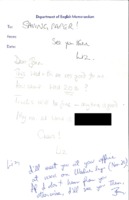 Communication between Liz Cullingford and John Ruszkiewicz
Communication between Liz Cullingford and John Ruszkiewicz Personal communication between Cullingford and Ruszkiewicz setting up a lunch to discuss E 306 and the English department climate. Handwritten contact redacted.
In a handwritten account, Ruszkiewicz provides details of their lunch. He comments that although the lunch was cordial, he isn't sure if any new common ground was reached.
-
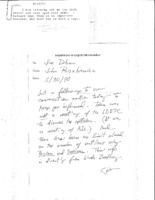 John Ruszkiewicz Personal Memo to Jim Duban 30 May 1990 with attached Personal Note from Jim Duban to John Ruszkiewicz 14 April 1992
John Ruszkiewicz Personal Memo to Jim Duban 30 May 1990 with attached Personal Note from Jim Duban to John Ruszkiewicz 14 April 1992 Ruszkiewicz notes to Duban on E 306 meetings, stating there will be no limit to the number of sections using the Racism and Sexism textbook. Attached: a personal note from Duban to Ruszkiewicz saying this is an important historical document and should be preserved.
-
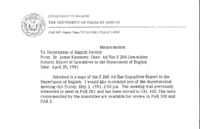 Kinneavy memo attached to E 306 ad hoc committee report
Kinneavy memo attached to E 306 ad hoc committee report Memo attached to ad hoc report on E 306, but report not contained in this file.
-
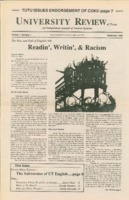 "Readin', Writin', and Racism" by Brian Willats
"Readin', Writin', and Racism" by Brian Willats Article in _University Review_ dealing with E 306 controversy largely from a conservative stance.
-
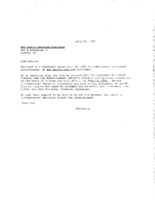 "Public Letter to Austin American Statesman"
"Public Letter to Austin American Statesman" Open Letter for publication from various faculty protesting new E 306. Unclear whether or not published.
-
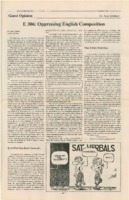 "E 306: Oppressing Composition" by Alan Gribben
"E 306: Oppressing Composition" by Alan Gribben Article published by Gribben in _University Review_, a student journal, criticizing proposed changes for E 306.
-
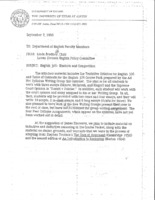 Linda Brodkey Memo on E 306 with Attached Syllabi
Linda Brodkey Memo on E 306 with Attached Syllabi Memo to English Department addressing syllabi and materials for E 306 with sample materials attached
-
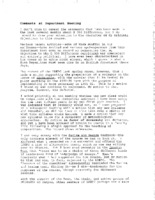 Comments at Department Meeting
Comments at Department Meeting Letter protesting comments made about author at a recent department meeting, regarding E 306 controversy. Possibly by Gribben or Duban.
-
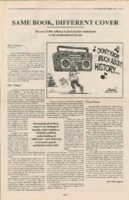 "Same Book, Different Cover" _University Review_ article by John Thompson
"Same Book, Different Cover" _University Review_ article by John Thompson Article discussing E 306 controversy and largely condemning Brodkey and the LDEPC.
-
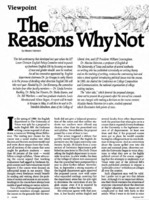 The Reasons Why Not
The Reasons Why Not Hairston, Maxine. "The Reasons Why Not." _Alcalde_ May/June 1991, pp. 12-13.
Maxine Hairston’s viewpoint on why E 306 “Writing about Difference” should not be mandated for all sections.
-
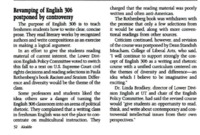 Revamping English 306 Postponed by Controversy
Revamping English 306 Postponed by Controversy A description of the controversy over E 306 curriculum change.
-
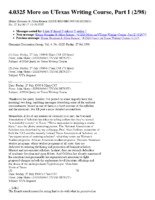 John Slatin's Reply to Query on Texas Writing Course
John Slatin's Reply to Query on Texas Writing Course Listserve/Discussion Group post from Slatin responding to questions about the controversy over E 306's curriculum change, and criticizing the move to cancel it.
-
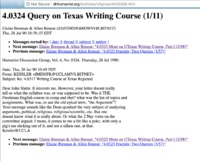 Query on Texas Writing Course
Query on Texas Writing Course A Listserv/Discussion Group post asking Slatin for more explanation of his previous statements on the cancelation of the new E 306 curriculum.
http://dhhumanist.org/Archives/Virginia/v04/0326.html
-
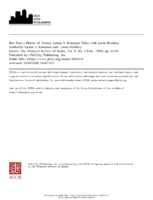 Not Just a Matter of Course: Lillian S. Robinson Talks with Linda Brodkey
Not Just a Matter of Course: Lillian S. Robinson Talks with Linda Brodkey Robinson, a visiting professor at UT during the E 306 controversy, conducts a friendly interview with Brodkey in the Women's Review of Books. Brodkey refutes claims that "Writing About Difference" was a multiculturalism class, saying that in fact it was a course about federal anti-discrimination law and pointing out that the Rothenberg reader was ultimately not assigned. The two lament the poor treatment they received at the hands of their opposition, the school administration, and the Texas media.
-
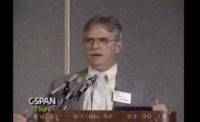 Fighting Political Correctness in Academia
Fighting Political Correctness in Academia From C-SPAN:
"Professor Alan Gribben detailed his experiences fighting “political correctness” in academia in an address to a forum of the conservative educators' group Accuracy in Academia entitled, 'How to Fight Classroom Injustice.' Professor Gribben reported harassment from his colleagues and administrators after he began to expose the liberal bias in American higher education curricula he characterized as engineered by the radical left. He responded to questions from the audience following his prepared remarks."
Gribben, Alan. "Fighting Political Correctness in Academia." C-SPAN, 2 July 1992, https://www.c-span.org/video/?26898-1/fighting-political-correctness-academia
-
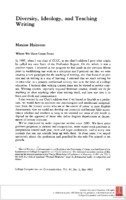 Diversity, Ideology, and Teaching Writing
Diversity, Ideology, and Teaching Writing Hairston warns against ideological creep into the writing classroom. Emphasizing that she herself is (or was) a political liberal, she argues that a "process-oriented, low-risk, student-centered classroom" makes students more comfortable, fosters self-expression, and engages interest. She ends with a call to action to fellow likeminded professors.
-
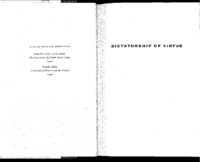 Dictatorship of Virtue
Dictatorship of Virtue Bernstein, Richard. Dictatorship of Virtue. New York: Alfred A. Knopf, 1994.
Richard Bernstein’s book-length version of his NYT article about PC culture on U.S. college campuses. Chapter 9 is about the 306 controversy, focusing on Brodkey and Gribben, but featuring quotes from interviews with Ruszkiewicz and Kruppa.
Richard Bernstein’s book-length version of his NYT article about PC culture at US colleges. Chapter 9 features the 306 controversy, focusing on the conflict between Brodkey and Gribben, but citing interviews with Ruszkiewicz and Kruppa also
 "E 306 Reforms Would Protect Students from Indoctrination" Part Two of a two-part editorial in support of the change in E 306 curriculum. p. 4
"E 306 Reforms Would Protect Students from Indoctrination" Part Two of a two-part editorial in support of the change in E 306 curriculum. p. 4 Packet for the New E 306 Syllabus The full course packet, including syllabus, reading assignments, and assignment descriptions for E 306 "Writing about Difference"
Packet for the New E 306 Syllabus The full course packet, including syllabus, reading assignments, and assignment descriptions for E 306 "Writing about Difference" "Recomposition: Confusion Reigns in the World According to Alan Gribben" Editorial critiquing Gribben's public complaints about E 306, as well as the open letter in the Daily Texan, "A Statement of Academic Concern." p. 4.
"Recomposition: Confusion Reigns in the World According to Alan Gribben" Editorial critiquing Gribben's public complaints about E 306, as well as the open letter in the Daily Texan, "A Statement of Academic Concern." p. 4. "Gribben Asks Faculty Senate to Screen E 306" News article reporting Gribben's call for Faculty Senate to screen E 306's new curriculum. pp. 1-2
"Gribben Asks Faculty Senate to Screen E 306" News article reporting Gribben's call for Faculty Senate to screen E 306's new curriculum. pp. 1-2 "English 306 not for Politics", "Fix E 306 and stop Bitching", "English or Indoctrination" Letters to the editor regarding a previous Daily Texan editorial on the E 306 curriculum controversy from Taylor, Assistant Instructor in English, Garcia, English Graduate, and Budzieszewski, Associate Professor of Government. p. 4
"English 306 not for Politics", "Fix E 306 and stop Bitching", "English or Indoctrination" Letters to the editor regarding a previous Daily Texan editorial on the E 306 curriculum controversy from Taylor, Assistant Instructor in English, Garcia, English Graduate, and Budzieszewski, Associate Professor of Government. p. 4 The Decomposition of English Response to elimination of E 346K.
The Decomposition of English Response to elimination of E 346K. Proposals on Composition, 9 May 1980 A 12-page version of the proposals to revise the English composition curriculum, requiring E 306, E 316, and establishing a new course (E 346K).
Proposals on Composition, 9 May 1980 A 12-page version of the proposals to revise the English composition curriculum, requiring E 306, E 316, and establishing a new course (E 346K). Standard English at the University of Texas Friedman, Alan. "Standard English at the University of Texas." in _Situating College English: Lessons from an American University. Eds. Evan Carton and Alan Friedman. Westport, CT: Bergin and Garvey, 1996. 3-16. A collection of essays that was originally was produced following the spring 1992 “Pedagogy and Values” conference at UT. The collection is edited by Alan Friedman and Evan Carton, dedicated to Linda Brodkey. Its contributors include: Collection of essays edited by Carton and Friedman, featuring articles by Friedman, Carton Jacqueline Bacon, Helena Woodard, Louis Mendoza, Rachel Jennings, S. Shankar, Jean Lee Cole and Jennifer Huth, Gordon Grant III, Robert Twombly, Jerome Bump, Nancy L. Peterson, Sara Kimball, James Kinneavy, Kathleen Kane, Edward Madden, Margot Gayle Backus, Alison Regan, Susan Claire Warshauer, Kim Emery. Friedman’s essay recovers the canon wars and responds directly to Lynne Cheney’s Telling the Truth and Richard Bernstein’s Dictatorship of Virtue. He also retells the E 306 controversy with special emphasis on Gribben’s contributions, saying external opposition to the course stemmed from misinformation.
Standard English at the University of Texas Friedman, Alan. "Standard English at the University of Texas." in _Situating College English: Lessons from an American University. Eds. Evan Carton and Alan Friedman. Westport, CT: Bergin and Garvey, 1996. 3-16. A collection of essays that was originally was produced following the spring 1992 “Pedagogy and Values” conference at UT. The collection is edited by Alan Friedman and Evan Carton, dedicated to Linda Brodkey. Its contributors include: Collection of essays edited by Carton and Friedman, featuring articles by Friedman, Carton Jacqueline Bacon, Helena Woodard, Louis Mendoza, Rachel Jennings, S. Shankar, Jean Lee Cole and Jennifer Huth, Gordon Grant III, Robert Twombly, Jerome Bump, Nancy L. Peterson, Sara Kimball, James Kinneavy, Kathleen Kane, Edward Madden, Margot Gayle Backus, Alison Regan, Susan Claire Warshauer, Kim Emery. Friedman’s essay recovers the canon wars and responds directly to Lynne Cheney’s Telling the Truth and Richard Bernstein’s Dictatorship of Virtue. He also retells the E 306 controversy with special emphasis on Gribben’s contributions, saying external opposition to the course stemmed from misinformation. Communication between Liz Cullingford and John Ruszkiewicz Personal communication between Cullingford and Ruszkiewicz setting up a lunch to discuss E 306 and the English department climate. Handwritten contact redacted. In a handwritten account, Ruszkiewicz provides details of their lunch. He comments that although the lunch was cordial, he isn't sure if any new common ground was reached.
Communication between Liz Cullingford and John Ruszkiewicz Personal communication between Cullingford and Ruszkiewicz setting up a lunch to discuss E 306 and the English department climate. Handwritten contact redacted. In a handwritten account, Ruszkiewicz provides details of their lunch. He comments that although the lunch was cordial, he isn't sure if any new common ground was reached. John Ruszkiewicz Personal Memo to Jim Duban 30 May 1990 with attached Personal Note from Jim Duban to John Ruszkiewicz 14 April 1992 Ruszkiewicz notes to Duban on E 306 meetings, stating there will be no limit to the number of sections using the Racism and Sexism textbook. Attached: a personal note from Duban to Ruszkiewicz saying this is an important historical document and should be preserved.
John Ruszkiewicz Personal Memo to Jim Duban 30 May 1990 with attached Personal Note from Jim Duban to John Ruszkiewicz 14 April 1992 Ruszkiewicz notes to Duban on E 306 meetings, stating there will be no limit to the number of sections using the Racism and Sexism textbook. Attached: a personal note from Duban to Ruszkiewicz saying this is an important historical document and should be preserved. Kinneavy memo attached to E 306 ad hoc committee report Memo attached to ad hoc report on E 306, but report not contained in this file.
Kinneavy memo attached to E 306 ad hoc committee report Memo attached to ad hoc report on E 306, but report not contained in this file. "Readin', Writin', and Racism" by Brian Willats Article in _University Review_ dealing with E 306 controversy largely from a conservative stance.
"Readin', Writin', and Racism" by Brian Willats Article in _University Review_ dealing with E 306 controversy largely from a conservative stance. "Public Letter to Austin American Statesman" Open Letter for publication from various faculty protesting new E 306. Unclear whether or not published.
"Public Letter to Austin American Statesman" Open Letter for publication from various faculty protesting new E 306. Unclear whether or not published. "E 306: Oppressing Composition" by Alan Gribben Article published by Gribben in _University Review_, a student journal, criticizing proposed changes for E 306.
"E 306: Oppressing Composition" by Alan Gribben Article published by Gribben in _University Review_, a student journal, criticizing proposed changes for E 306. Linda Brodkey Memo on E 306 with Attached Syllabi Memo to English Department addressing syllabi and materials for E 306 with sample materials attached
Linda Brodkey Memo on E 306 with Attached Syllabi Memo to English Department addressing syllabi and materials for E 306 with sample materials attached Comments at Department Meeting Letter protesting comments made about author at a recent department meeting, regarding E 306 controversy. Possibly by Gribben or Duban.
Comments at Department Meeting Letter protesting comments made about author at a recent department meeting, regarding E 306 controversy. Possibly by Gribben or Duban. "Same Book, Different Cover" _University Review_ article by John Thompson Article discussing E 306 controversy and largely condemning Brodkey and the LDEPC.
"Same Book, Different Cover" _University Review_ article by John Thompson Article discussing E 306 controversy and largely condemning Brodkey and the LDEPC. The Reasons Why Not Hairston, Maxine. "The Reasons Why Not." _Alcalde_ May/June 1991, pp. 12-13. Maxine Hairston’s viewpoint on why E 306 “Writing about Difference” should not be mandated for all sections.
The Reasons Why Not Hairston, Maxine. "The Reasons Why Not." _Alcalde_ May/June 1991, pp. 12-13. Maxine Hairston’s viewpoint on why E 306 “Writing about Difference” should not be mandated for all sections. Revamping English 306 Postponed by Controversy A description of the controversy over E 306 curriculum change.
Revamping English 306 Postponed by Controversy A description of the controversy over E 306 curriculum change. John Slatin's Reply to Query on Texas Writing Course Listserve/Discussion Group post from Slatin responding to questions about the controversy over E 306's curriculum change, and criticizing the move to cancel it.
John Slatin's Reply to Query on Texas Writing Course Listserve/Discussion Group post from Slatin responding to questions about the controversy over E 306's curriculum change, and criticizing the move to cancel it. Query on Texas Writing Course A Listserv/Discussion Group post asking Slatin for more explanation of his previous statements on the cancelation of the new E 306 curriculum. http://dhhumanist.org/Archives/Virginia/v04/0326.html
Query on Texas Writing Course A Listserv/Discussion Group post asking Slatin for more explanation of his previous statements on the cancelation of the new E 306 curriculum. http://dhhumanist.org/Archives/Virginia/v04/0326.html Not Just a Matter of Course: Lillian S. Robinson Talks with Linda Brodkey Robinson, a visiting professor at UT during the E 306 controversy, conducts a friendly interview with Brodkey in the Women's Review of Books. Brodkey refutes claims that "Writing About Difference" was a multiculturalism class, saying that in fact it was a course about federal anti-discrimination law and pointing out that the Rothenberg reader was ultimately not assigned. The two lament the poor treatment they received at the hands of their opposition, the school administration, and the Texas media.
Not Just a Matter of Course: Lillian S. Robinson Talks with Linda Brodkey Robinson, a visiting professor at UT during the E 306 controversy, conducts a friendly interview with Brodkey in the Women's Review of Books. Brodkey refutes claims that "Writing About Difference" was a multiculturalism class, saying that in fact it was a course about federal anti-discrimination law and pointing out that the Rothenberg reader was ultimately not assigned. The two lament the poor treatment they received at the hands of their opposition, the school administration, and the Texas media. Fighting Political Correctness in Academia From C-SPAN: "Professor Alan Gribben detailed his experiences fighting “political correctness” in academia in an address to a forum of the conservative educators' group Accuracy in Academia entitled, 'How to Fight Classroom Injustice.' Professor Gribben reported harassment from his colleagues and administrators after he began to expose the liberal bias in American higher education curricula he characterized as engineered by the radical left. He responded to questions from the audience following his prepared remarks." Gribben, Alan. "Fighting Political Correctness in Academia." C-SPAN, 2 July 1992, https://www.c-span.org/video/?26898-1/fighting-political-correctness-academia
Fighting Political Correctness in Academia From C-SPAN: "Professor Alan Gribben detailed his experiences fighting “political correctness” in academia in an address to a forum of the conservative educators' group Accuracy in Academia entitled, 'How to Fight Classroom Injustice.' Professor Gribben reported harassment from his colleagues and administrators after he began to expose the liberal bias in American higher education curricula he characterized as engineered by the radical left. He responded to questions from the audience following his prepared remarks." Gribben, Alan. "Fighting Political Correctness in Academia." C-SPAN, 2 July 1992, https://www.c-span.org/video/?26898-1/fighting-political-correctness-academia Diversity, Ideology, and Teaching Writing Hairston warns against ideological creep into the writing classroom. Emphasizing that she herself is (or was) a political liberal, she argues that a "process-oriented, low-risk, student-centered classroom" makes students more comfortable, fosters self-expression, and engages interest. She ends with a call to action to fellow likeminded professors.
Diversity, Ideology, and Teaching Writing Hairston warns against ideological creep into the writing classroom. Emphasizing that she herself is (or was) a political liberal, she argues that a "process-oriented, low-risk, student-centered classroom" makes students more comfortable, fosters self-expression, and engages interest. She ends with a call to action to fellow likeminded professors. Dictatorship of Virtue Bernstein, Richard. Dictatorship of Virtue. New York: Alfred A. Knopf, 1994. Richard Bernstein’s book-length version of his NYT article about PC culture on U.S. college campuses. Chapter 9 is about the 306 controversy, focusing on Brodkey and Gribben, but featuring quotes from interviews with Ruszkiewicz and Kruppa. Richard Bernstein’s book-length version of his NYT article about PC culture at US colleges. Chapter 9 features the 306 controversy, focusing on the conflict between Brodkey and Gribben, but citing interviews with Ruszkiewicz and Kruppa also
Dictatorship of Virtue Bernstein, Richard. Dictatorship of Virtue. New York: Alfred A. Knopf, 1994. Richard Bernstein’s book-length version of his NYT article about PC culture on U.S. college campuses. Chapter 9 is about the 306 controversy, focusing on Brodkey and Gribben, but featuring quotes from interviews with Ruszkiewicz and Kruppa. Richard Bernstein’s book-length version of his NYT article about PC culture at US colleges. Chapter 9 features the 306 controversy, focusing on the conflict between Brodkey and Gribben, but citing interviews with Ruszkiewicz and Kruppa also